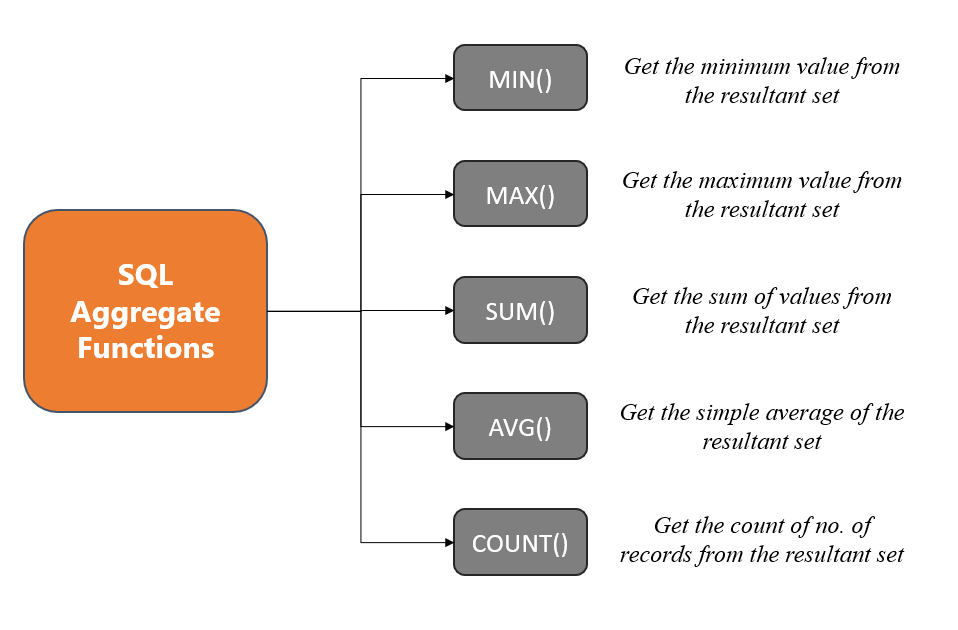SQLAlchemy – Aggregate Functions
Last Updated :
21 Feb, 2022
In this article, we will see how to select the count of rows using SQLAlchemy using Python.
Before we begin, let us install the required dependencies using pip:
pip install sqlalchemy
Since we are going to use MySQL in this post, we will also install a SQL connector for MySQL in Python. However, none of the code implementations changes with change in the database except for the SQL connectors.
pip install pymysql
There are 5 SQL aggregate functions used often as shown below:

SQL Aggregate Functions
In this article, we will cover the examples for each of the above aggregate functions. In both examples, we will count the number of records present in the payment table within the sakila database. The sample record from the payment table looks like:

Payment Table
If you do not have sakila database and want to follow along with this article without installing it then use the SQL script present in the link mentioned below to create the required schema and payment table along with the records. Sakila Payment Table Script
The `func` function in SQLAlchemy is used to implement these aggregate functions. The below table summarizes the method used for each of the aggregate functions.
| SQL Aggregate Function |
SQLAlchemy Method |
| MIN() |
sqlalchemy.func.min() |
| MAX() |
sqlalchemy.func.max() |
| SUM() |
sqlalchemy.func.sum() |
| AVG() |
sqlalchemy.func.avg() |
| COUNT() |
sqlalchemy.func.count() |
MIN()
Here we will use sqlalchemy.func.min() function to get minimum element for rows.
Syntax: sqlalchemy.select([sqlalchemy.func.min(sqlalchemy.DeclarativeMeta)])
Code:
Python
import sqlalchemy as db
engine = db.create_engine("mysql+pymysql://\
root:password@localhost/sakila")
meta_data = db.MetaData(bind=engine)
db.MetaData.reflect(meta_data)
payment_table = meta_data.tables['payment']
query = db.select([db.func.min(payment_table.c.amount)])
result = engine.execute(query).first()
print(result[0])
|
Output:
0.00
MAX()
Here we will use sqlalchemy.func.max() function to get maximum element for rows.
Syntax: sqlalchemy.select([sqlalchemy.func.max(sqlalchemy.DeclarativeMeta)])
Code:
Python
import sqlalchemy as db
engine = db.create_engine("mysql+pymysql://\
root:password@localhost/sakila")
meta_data = db.MetaData(bind=engine)
db.MetaData.reflect(meta_data)
payment_table = meta_data.tables['payment']
query = db.select([db.func.max(payment_table.c.amount)])
result = engine.execute(query).first()
print(result[0])
|
Output:
11.99
SUM()
Here we will use sqlalchemy.func.sum() function to get sum element for rows.
Syntax: sqlalchemy.select([sqlalchemy.func.sum(sqlalchemy.DeclarativeMeta)])
Code:
Python
import sqlalchemy as db
engine = db.create_engine("mysql+pymysql://\
root:password@localhost/sakila")
meta_data = db.MetaData(bind=engine)
db.MetaData.reflect(meta_data)
payment_table = meta_data.tables['payment']
query = db.select([db.func.sum(payment_table.c.amount)])
result = engine.execute(query).first()
print(result[0])
|
Output:
67416.51
AVG()
Here we will use sqlalchemy.func.avg() function to get average element for rows.
Syntax: sqlalchemy.select([sqlalchemy.func.avg(sqlalchemy.DeclarativeMeta)])
Code:
Python
import sqlalchemy as db
engine = db.create_engine("mysql+pymysql://\
root:password@localhost/sakila")
meta_data = db.MetaData(bind=engine)
db.MetaData.reflect(meta_data)
payment_table = meta_data.tables['payment']
query = db.select([db.func.avg(payment_table.c.amount)])
result = engine.execute(query).first()
print(result[0])
|
Output:
4.200667
COUNT()
Here we will use sqlalchemy.func.count() function to get number of rows.
Syntax: sqlalchemy.select([sqlalchemy.func.count(sqlalchemy.DeclarativeMeta)])
Code:
Python
import sqlalchemy as db
engine = db.create_engine("mysql+pymysql://\
root:password@localhost/sakila")
meta_data = db.MetaData(bind=engine)
db.MetaData.reflect(meta_data)
payment_table = meta_data.tables['payment']
query = db.select([db.func.count(payment_table.c.amount)])
result = engine.execute(query).first()
print(result[0])
|
Output:
16049
Share your thoughts in the comments
Please Login to comment...